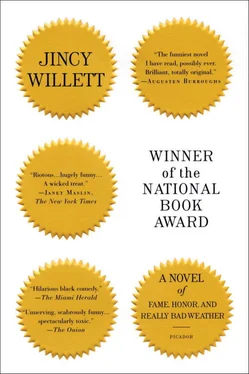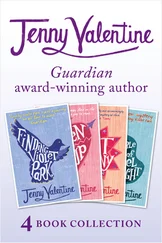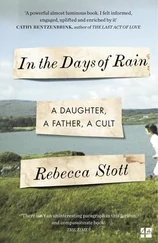The people with English names, that is. The clear majority of Rhode Islanders, who do not have English names, couldn’t care less about Solid Yankee Stock.
Our bogus heritage did influence us as children, but not in any way intelligible to Hilda. Our parents left Indianapolis in 1938, deciding to settle here in the Plantations rather than New Bedford. We were born in Providence, in the Lying-In, but to Hoosier parents dedicated, for two different sets of reasons (Father, out of obligation to his father; Mother, for sheer love of romance), to seeing that we were always mindful of our roots. We were raised on tales of the Mayflower voyage and the legendary deprivations of that first winter, but we were also raised by people with flat Indiana accents, which both of us picked up and still retain today. They sent us off to public school with weird speech patterns and imagined, I think, that our blood superiority would be tacitly recognized and acknowledged.
There was nothing tacit about it.
They called me Dork from the first day of first grade. I have been called Dork all my life. I don’t run home crying anymore. I used to beg Mother to change my name, and she would remind me of how special it was, and strong, my Solid Yankee Name.
Abigail, who had a much easier time of it, punched Nick Pappas in the mouth for tormenting me. And then he jumped on her and ground her face into the snow and I had to pull him off. We were seven. I remember it clearly because I was so surprised and impressed by my sister’s championing me, and then confused by how easy it was to pull Nick off her. I had thought her overpowered, in trouble. But she was twice his size and could have thrown him off any time.
That night was the last time I tried to get my name changed. Abigail backed me up. I even had a new name picked out: Stella. Stella, for the prettiest girl in class, a slender child with olive skin and hair the color of milk chocolate. “Stella is a Greek name,” Mother said.
“I want to be Greek,” I said.
Our parents laughed and explained that “we can’t just be everything we want to be.”
Oh, really?
“Besides,” Mother said, “you don’t realize how lucky you are to have a nickname already. Not every child receives one. You didn’t, did you, Jabez? And you both have been given yours already. Abby and Dork.”
Abigail and Father snorted, at the same instant, and their faces turned pink.
“What’s so funny?” Mother asked. “It’s no sillier sounding than Hank, or Jack, or…Gert. I think Dork is a nice—”
Father covered his eyes with his hand, and Abigail pounded the table with the handle of her spoon.
“What is going on?” They shrugged and shoveled food into their mouths and would not look at her or me. Mother was really angry. She took a slow breath and resumed eating in silence, and finally said, “We think you’re both rude. Don’t we, Dork?”
Ha ha ha ha ha.
Later that night Father must have explained things to Mother. Abigail explained them to me. Abigail at seven knew what a dork was, and quite a few of the other names by which it is called, and something of its function. Well, I did too. I could hardly help knowing, since in our inseparable preschool days I had accompanied her on her fact-finding missions. We went with little neighbor boys into garages and basements and behind bushes and under card tables tented with sheets on rainy days. She had an old flashlight Father had given her, and she made the battery last. She always invited the boy to inspect her, and he was always too scared, or too smart. She always invited me to join in, and I was always too scared, or too smart.
My sister’s face at such times became entirely opaque to me. I could never tell if she was in control or not. It seemed that something was in control, of the three of us, especially Abigail. What strikes me about it now is the total absence of nervous giggling. Abigail was never, never embarrassed by sex, and so it was impossible to be embarrassed about it in her presence. Which was, in a way, quite horrible. What do you do if you can’t laugh?
I bowed out of these sessions shortly after, on our sixth birthday, on which I got my little nurse’s uniform and she got her doctor’s kit. (We had not asked for these. How did they know? Why did they help us?) The whole thing became too frightening then, the possibilities too threatening. It was bad enough when she operated on me, or on the boy, or the other girls. (We didn’t use other girls much; they giggled.) There was never enough oxygen in our rainy-day tent, in our dusty attic, in the sunny open air. It was too soon, too soon. And when she lay beneath my hand, with her eyes softly shut, and did not move…We could do anything. Anything. We did nothing. But we could have done anything.
I told her I wasn’t interested anymore, and that it was a stupid thing to do. This was the first time I ever really hurt my sister, and she surprised me with the generosity with which she let me know it, her disinclination to hide her sorrowing face. But she never argued with me about it, or needled me.
When she lay in bed beside me and explained what a dork was, she was being kind.
Dirty girls have piggy faces and shifty eyes. Dirty girls always look unwashed, whether they are or not, and only other dirty girls will befriend them. Dirty girls always look cornered, desperate, as indeed they should, with their lives just begun and their backs already to the wall in a dead-end alleyway. My sister never was a dirty girl. She has been known about and talked about all her life, and when she got in trouble no one who knew her was surprised; but no one who knew her was happy about it, either, in the way we are reassured by the self-destruction of dirty girls. She was, from the beginning, just too powerful to be dismissed like that.
Also, as I said, she wasn’t a giggler. She didn’t find dirty words intrinsically funny. She found dirty words intrinsically interesting . When she laughed at the dinner table she was laughing at Mother’s ignorance. She adored Mother—we both did—but she always thought Mother’s innocence funny, whereas it plain worried me.
Mother was always giving us terrible advice. For instance, kids used to ride us about our Indiana accents. “Are you from the South?” they asked.
“We’re real Yankees,” we would say. This confused the issue, considerably.
“Why do you talk like that?”
“Like what?”
“Say summatime .”
“Summertime.”
“Summerrrrrtime.” Laughter. “Say byank .”
“Bank.”
Hilarity. “Say gool .”
“Goal.”
“Steer.”
“Stir.”
“Draw.”
“Drawer.”
“Drawrrrrrrr. What part of the South do you come from?”
“Our parents are from the Midwest.”
“What part of the South is that?”
They weren’t being cruel. Just skeptical. They were trying to figure things out, same as us. And though we were never hated, they always kept us somewhat apart from them. They suspected, I think, that we belonged at arm’s length. They suspected we thought ourselves better than they. This is because Mother was constantly warning us not to.
When we complained about feeling left out because English was spoken in our home, and our grandparents didn’t come over on a boat, and we didn’t have an Old Country, our mother instructed us to the effect that “all Americans are the children of immigrants. Yours just happened to emigrate a very long time ago. The fact that the boat your ancestors came over on was the Mayflower does not make you better than anyone else.”
Naturally we repeated this speech many times, to the children of people who just happened to emigrate twenty years before.
Читать дальше












